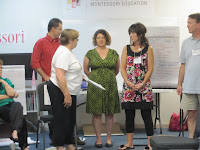 |
| Munir Shivji and Dr. Jane Nelsen at The Institute of Montessori Education - Houston. June 12, 2011 |
Positive Discipline is based on the concept that children want to belong and contribute. When you think about it, no one behaves well by being shamed and made to feel guilty. We were taught better ways to help our children learn respect and responsibility. With the positive discipline approach, children participate in making decisions that affect them based on limited choices that show respect for all involved. Rules and good behavior are encouraged and enforced with both firmness and kindness.
 Here are some questions Dr. Jane Nelsen asked us to think about when we were brainstorming ideas on creating long term, effective discipline plans:
Here are some questions Dr. Jane Nelsen asked us to think about when we were brainstorming ideas on creating long term, effective discipline plans:Do your children feel as though they belong?
Is what you're doing effective long-term?
Does it teach children to be concerned about others, teach cooperation and accountability?
- Positive Discipline gives you more time for fun,
- Parents enjoy their children more,
- You can parent without stress, anxiety and guilt,
- Positive Discipline avoids spanking and other forms of corporal punishment,
- You don’t have to bribe, nag and cajole children,
- Children learn from their mistakes,- You find real, practical solutions for tough problems,
- You have the respect of your children.
Adults who use Positive Discipline respect, nurture, and support their children. Children feel free to share ideas, feelings, ask questions and make choices. When adults are willing to observe and respond in ways that encourage positive behavior, you help the child become responsible for their own behavior. Participants who took this weekend's training received a certificate as a Certified Positive Discipline Parent Educator. Please contact TIME if you would like one of our newly certified participants to facilitate on-going parenting classes for you!




